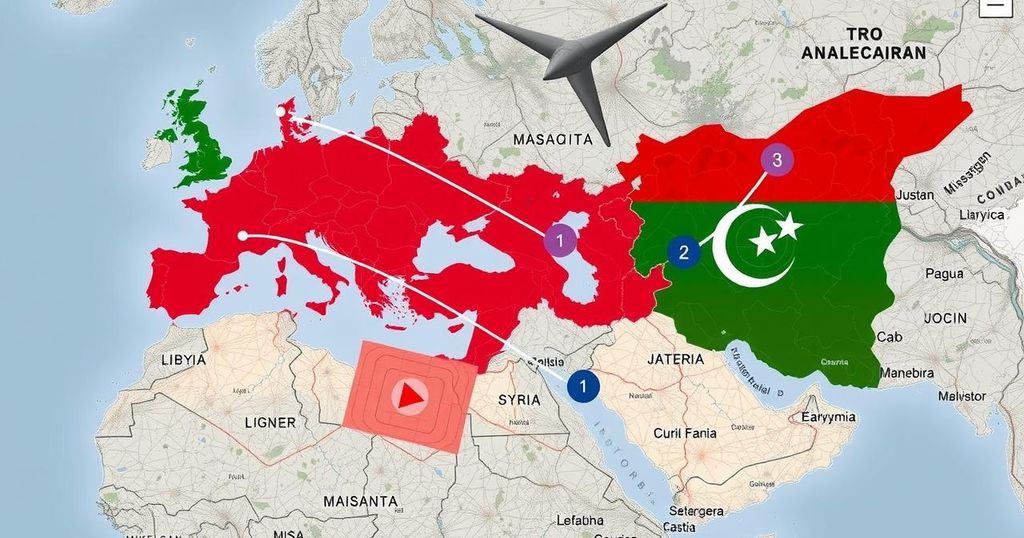This article examines the implications of Russia’s potential military redeployment from Syria to Libya, analyzing the geopolitical consequences for both nations and the wider region, particularly regarding NATO interests. The discussion highlights Russia’s established presence in Libya, the internal power struggles within Libya itself, and how these dynamics may influence international relations moving forward.
Recent analyses suggest that Russia may reassess its military presence in Libya following developments in Syria. Following its substantial involvement supporting Bashar al-Assad, Russia established key military assets in Syria, notably the Khmeimim air base and the Tartous naval base, the latter being Russia’s only warm-water port in the Mediterranean. However, as Syrian control shifts towards the Hayat Tahrir al-Sham faction, the future of these bases has become uncertain, prompting Russia to consider alternatives such as Libya, where its military influence is already established.
Given the strategic significance of Libya, which serves as a gateway to both North Africa and Europe, an increased Russian military footprint here could represent a significant geopolitical maneuver, particularly concerning NATO’s interests. Analysts opine that while Russia’s presence in Syria has dwindled, maintaining a foothold in Libya is crucial to expand its influence amid competition from Western powers. Oleg Ignatov from the International Crisis Group emphasizes that retaining a position in Africa aligns with Kremlin objectives, which have been in progress since 2017.
Despite clear intentions, evidence for a rapid increase in Russian military installations in Libya appears lacking, as satellite imagery does not indicate significant new developments at critical locations such as airfields and ports. However, experts suggest that such an influx could enable Russia to bolster military capabilities that would challenge NATO’s southern defenses. Anas El Gomati from the Sadeq Institute indicates that while Tobruk does not currently have the facilities of Tartous, its potential offers significant strategic advantages for Russian operations.
The internal political landscape in Libya complicates the situation. Since the 2011 revolution, Libya has fragmented into rival factions with competing claims to legitimacy and power, with no elections having occurred since December 2021. The emergence of a major Russian military presence in eastern Libya may bolster Khalifa Haftar, potentially skewing negotiations towards greater influence for him in Libyan politics. This alteration raises concerns, as such a move could lead to increased instability.
Simultaneously, Western diplomats seek to engage with Haftar amidst concerns surrounding increased Russian influence close to NATO territories. The geopolitical stakes encompass broader issues, including migration routes and energy supplies, positioning Libya as a critical player in hybrid warfare. As Tarek Megerisi of the European Council on Foreign Relations points out, Haftar’s alignment with Russian interests presents both opportunities and risks within the ongoing diplomatic landscape in Libya and beyond.
Russia’s military involvement in Syria over the past decade has been pivotal in preserving the Assad regime, leading to the establishment of key military infrastructure, such as the Khmeimim airbase and the Tartous naval base. However, as control in Syria fluctuates towards factions opposed to Russian interests, the durability of these bases is uncertain. Consequently, analysts suggest that Libya emerges as a viable alternative for Russia to maintain its strategic reach in North Africa and the Mediterranean.
In conclusion, Russia’s potential redeployment to Libya signifies a complex interplay of military strategy, geopolitical maneuvering, and local governance challenges. As Moscow seeks to sustain its influence amid shifting loyalties in Syria, its interest in Libya becomes a focal point for broader power dynamics in the region, particularly concerning NATO. The implications of increased Russian military presence in Libya could reverberate throughout ongoing political negotiations and stability efforts, underscoring the depth of external involvement in Libya’s ongoing turmoil.
Original Source: www.aljazeera.com






